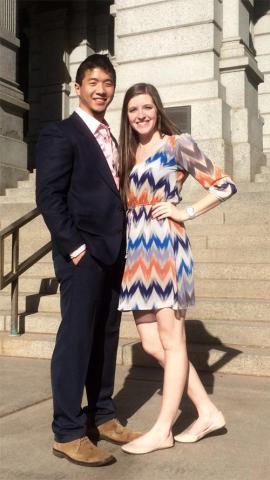Early in their second year, Jeff Cheng and Carrie Westfall have had a profound, positive impact on Cleveland’s new class. In addition to their own responsibilities, they implemented Mentor Shadow Day, which helped incoming students acclimate to the learning environment in the operating room.
Every April, first-year students in Cleveland are paired with a second year mentor prior to starting the MSA program. Mentors make themselves available via text, email, and phone to answer questions and to help orient the first-years. Some mentors even meet with mentees before they begin class, to familiarize them with the hospital and with classrooms. This allows the newbies to feel more comfortable and confident on their first day.
As members of the Class of 2017 beginning their service as student chiefs, Carrie and Jeff looked back to their experiences when they first started the program. They asked themselves: “What would have improved things for us?” and decided it would have been good to start in the operating room with a peer.
“Small things like knowing where the supplies are kept and how to connect IVs make all the difference when everything is new,” said Jeff.
Since MSA students spend the first few days in the operating room observing, or “shadowing”, designating this new experience as “Mentor Shadow Day” was logical. The chiefs got the administration’s go-ahead, created a plan, and began putting it into action.
On Monday, June 27, their student mentors introduced members of the Class of 2018 to the clinical setting and one-on-one instruction. Gracious clinical instructors at MetroHealth Medical Center on Cleveland’s near west side and at University Hospitals Case Medical Center in University Circle accommodated two students that day.
First-year student Leah Snyder said of her experience: “My mentor made my transition into the program a lot easier. Having a "buddy" going into the OR for the first time was super-helpful. She explained the expectations of the instructors, coached me on how to communicate with [them], showed me around the OR, went through a machine check with me, and offered me advice.”
As second-year students, Jeff and Carrie spend five days a week in the OR, attend classes and lectures before and after, and then go home to an evening of study. Add to this student chief responsibilities that include finding faculty to lead board exam review sessions, being available to their student constituents, and preparing for the annual American Society of Anesthesiologists meeting.
It would be understandable if that was enough for two hard-working graduate students to juggle. But not for these two. They created another way to support their fellow students. Carrie and Jeff are clearly student leaders with heart and these two have more ideas about how to support the best learning environment.


